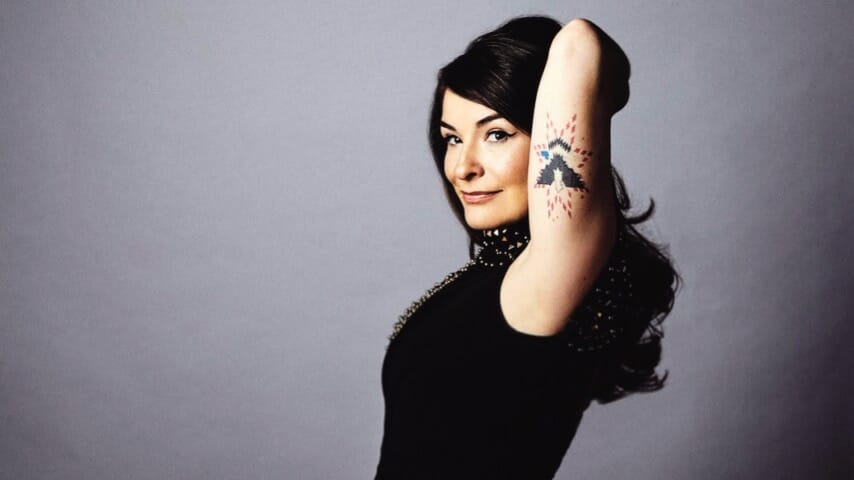The Incredible Journey of Madisyn Whajne
Photo by Jen Squires
There have been some remarkable Horatio Alger tales swirling up out of this year’s soul-crushing pandemic. But few feel as triumphant as the truly surreal story of Canadian crooner Madisyn Whajne (pronounced Wayne), who just released her dazzling power-pop debut disc Save Our Hearts after two decades of hardscrabble struggle, which even included going a personal round with the deadly COVID-19—alongside her husband and eight-year old son—this spring. “The virus went through our household, and we were sick for about 40 days, but we couldn’t get a test because we didn’t qualify,” she recalls, shivering at the recent memory. “I drove to the testing center so many times, and I got turned down every single time.”
For one three-night nadir, she felt like she had a 20-pound weight pressing down on her chest. Too frightened to go to the hospital, she quietly drafted her last will and testament one evening in bed. “And then I was too scared to go to sleep, because I remember thinking that I was not gonna wake up in the morning,” she sighs.
This was only the latest stumbling block tossed by fate into the Ontario artist’s cluttered path. Yet salvation came in the strangest of guises—as a kid, Whajne knew from her adoptive parents that she had been born Native American on Manitoulin Island, a member of the Ojibwe, or Chippewa First Nations tribe. But until two years ago, when she was informed of a class-action lawsuit initiated by Beaverhouse chief Marcia Brown Martel, she had no idea of the full extent of her heritage, and that she’d been part of her country’s notorious Sixties Scoop, during which over 20,000 aboriginal children were forcibly taken from their supposedly unfit mothers and rehoused in foster care or put up for adoption. She filled out the paperwork to take part in Brown v. Canada, and was stunned to hear that the judge had ruled in favor of the plaintiffs, to the tune of $800 million, Canadian. Already-completed Save Our Hearts anthems like “Summer Love,” “Sweet Talk,” and “When Morning Comes”—which chime like “Crash”-era Primitives over a Modern English, circa “Melt With You” backbeat—were collecting dust on the studio shelf, until she was able to release them via her generous settlement check. It was unexpected, long-overdue justice. But poetic justice just the same.
“This record had already cost me a whole lot more than I ever expected,” explains Whajne, who sat on the project for two frustrating years. “So it was a money issue—it was mixed, it was mastered, but I didn’t want to just put it up on Spotify. I knew I wanted to do it in a certain way—I wanted to do videos, I wanted to hire good PR. Since this was my first record going out into the world, I knew it had to be exactly right.” When her money arrived, serendipitously, she didn’t have to think twice about how best to put it to use. “I was like, ‘Alright! Let’s press some vinyl! Let’s hire a team!’,” she says. “The government finally admitted to what they did, there was a big lawsuit, I applied and gave them all my information, and the money just kept coming in at the right time. So I guess it was all meant to be.”
And probably in more ways than one. If this underdog hadn’t lived the serpentine, up-then-down-again life she has, and spat out a slam-bang debut disc at 21, it wouldn’t glisten with the same keen hooks, clever recording techniques, and ABBA-confident vocals heard on Save, which synthesizes all of her early influences—Blondie, The Go-Go’s, Joan Jett,—with later ones like The Raveonettes and The Vaccines into a seasoned sound all her own. Her carefully-cultivated band is just as learned—her producer Jay McBride plays Peter Hook-melodic bass, longtime co-writer James Gray prods her to new heights with Will Sergeant-evocative guitar passages, and her husband Bobby Bulat (who until recently backed his older sister Basia Bulat) keeps everything crackling with a Killers-propulsive beat. Whajne plays Hammond B-3 and electric six-string, and has mastered the art of double-tracking her vocals. “I just sing on top of my own voice and we add less than a one-second delay,” she says. “And then we pan them at about 11 o’clock on each side, and then soak the mix in reverb, and it creates this really beautiful sound. It’s taken me a long time, learning to like my voice, but now being in the studio is one of my most favorite things in the world.”
-

-

-

-

-

-

-

-

-

-

-

-

-

-

-

-

-

-

-

-

-

-

-

-

-

-

-

-

-

-

-

-

-

-

-

-

-

-

-

-








































